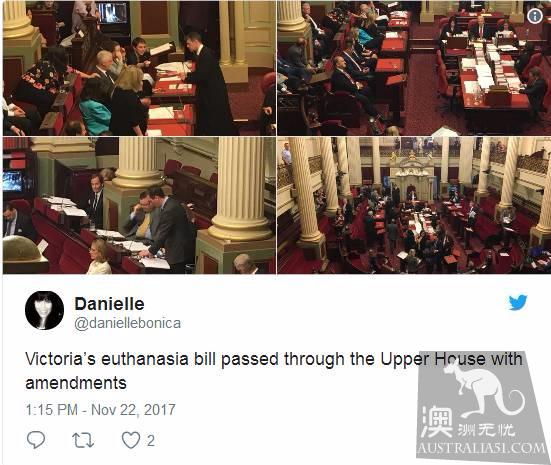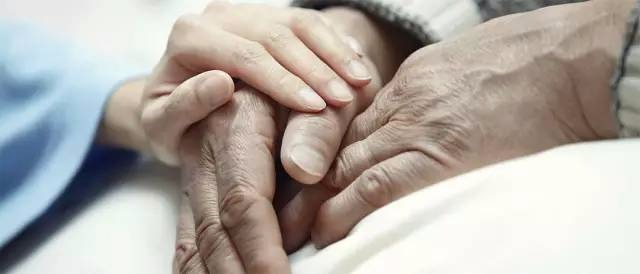After 28 hours of heated debate, the state`s controversial euthanasia bill was passed in the upper house by 22 votes to 18 on Wednesday.

Faced with such a hard-won result, many members of the Legislative Council were excited, hugging each other and even crying.

So far, Victoria has only one last step to legalize euthanasia-the House of Commons.
As early as last month, the House of Commons passed the euthanasia bill by 47 votes to 37. But in order to ensure that the bill passes smoothly in the upper house, the government has been forced to make some changes to some of its contents, so next week the revised bill will return to the lower house for approval and then come into force.
But since the House of Commons has been say before yes, there is no suspense about the so-called vote. As a result, the Australian media used a very positive tone in the report: Victoria is bound to make history, Australia`s first state can legally euthanasia!


So here`s the question:
What kind of person is eligible to apply for euthanasia? The revised bill sets out several criteria:
18 years of age;
Sobering up;
Stay in Victoria for at least 12 months (this is not provided for in the previous Act);
There is an incurable disease, and it causes unbearable suffering. The illness is severe and will not last for six months (the bill before the amendment was 12 months). However, with the exception of patients with neurodegenerative disease (neurodegenerative conditions), their time was still 12 months.
(a) simply because mental illness or mental disability is not sufficient to justify an application for euthanasia, an application for euthanasia is not denied to a person who is eligible and who is also suffering from mental illness or disability;
The patient`s death certificate must state that the way of death is euthanasia (this is not provided for in the previous Act).

How does euthanasia work?
- The patient must confirm his or her willingness to die without coercion and make two formal applications and a written statement;
- Three applications will be evaluated by two separate doctors within 10 days, and if approved, the doctor will prescribe euthanasia drugs to be prescribed by pharmacists;
- Finally, the patient must take or inject euthanasia on his own. In rare cases, if the patient is unable to euthanize himself for physical reasons, he may be assisted by a doctor;
- The patient must appoint a contact to return the unused drugs to the pharmacist;
- If doctors themselves oppose euthanasia, they have the right to refuse to provide information about euthanasia, prescribe euthanasia drugs or assist patients with euthanasia drugs.
What kind of euthanasia drugs?
This is not specified in the bill, but only that the prescribing doctor specifies what drugs are used. But federal law prohibits Nembutal, a drug currently used to euthanize pets, from being used in humans. In addition, euthanasia drugs will be stored in a locked box.
A parliamentary report says clinicians need time to prepare before euthanasia laws come into effect. The report calls for an 18-month gap between the enactment of the bill and the formal implementation of euthanasia.
How many people apply for euthanasia?
About 150 people are expected to apply for euthanasia each year in the state.
Euthanasia has always been a controversial and sensitive topic. The English word "Euthanasia" for euthanasia comes from Greek, meaning good death, death. It is a way of letting a patient die as painlessly as possible when he or she needs to suffer for a long time from a disease that cannot be recovered.
Euthanasia has long been controversial as "murder" and "assisted suicide".
So the state bill stipulates that all doctors and nurses are not allowed to intervene in patients` euthanasia applications, and doctors are prohibited from holding any discussions with patients about ending their lives. In other words, euthanasia must be entirely motivated by the patient`s own will and cannot be encouraged, hinted, or persuaded by anyone.
In addition, in order to prevent some patients from being ill-treated or threatened to apply for euthanasia, 68 "safeguards" are listed in the bill, including the review of all cases of euthanasia by a special committee; The act of threatening euthanasia is considered a crime, etc.
Euthanasia is divided into three types: voluntary euthanasia, involuntary euthanasia and unconscious euthanasia. At present, only voluntary euthanasia is legally recognized in a number of countries and regions, including:
Belgium, Colombia, India (for permanent plants only), Ireland, Canada, Luxembourg, Mexico, Netherlands and parts of the United States.
The state bill is unintended for critically ill patients and their families because it allows patients to die with dignity.
Although nothing in this world is more important than life, is it a step forward to have the right to end a painful life if one cannot decide his right to birth?

